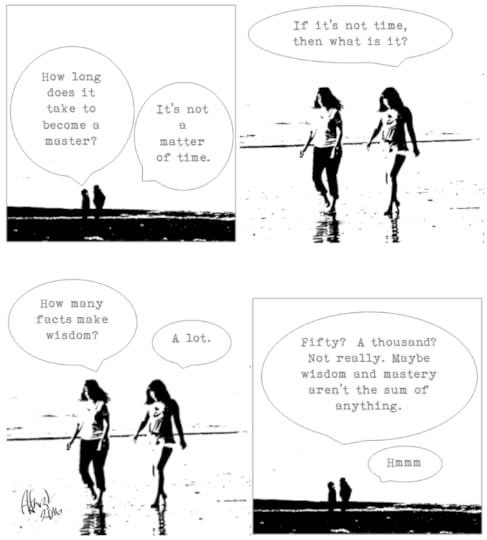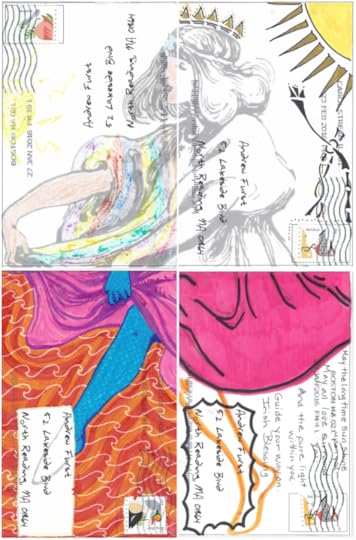Andrew Furst's Blog, page 45
September 12, 2016
Women & Sex – Dialectic Two Step
Estimated reading time: 8 minute(s)
A recent post over at the Culture Monk stunned me. The author, Kenneth Justice, is a guy I like to read and who often has good things to say. I’m chalking it up to a bad cup of coffee. I’ll let you decide.
Here are some excerpts.
A friend of mine was talking about the great advancements women have experienced in the area of sexuality,
“Back in the old world, men used to be allowed to rape their wife; they could make their wife have sex even if she didn’t want to, and back in the old world, women generally didn’t enjoy sex” he said.
As I listened to my friend, I couldn’t help but be amazed at how brainwashed people in our day and age have become……because everything my friend was saying was totally untrue.
….
Women are more miserable in our day and age than ever before.
You see, with all the advancements of the feminist movement (and many of those advancements have been good!), women in the 21st century are experiencing the highest rates of depression and mental disorders than in the history of the earth. Despite the fact that more women graduate college nowadays than men, depression, anxiety, loneliness, and feelings of disconnectedness are ravaging our communities.
…
Our culture is obsessed with sex. We think that sex is somehow the greatest thing that exists…..and if I haven’t annoyed you yet, wait till you read my next sentence; sex is not the greatest thing that exists.
Response: You’ve conflated and correlated a lot of stuff here. Let’s go through it.
First you group two facts and a falsehood and call them all false
true fact – women were for a long time considered property
true fact – marriage exclusions for rape weren’t removed until the 1980s
falsehood – women don’t enjoy sex
You put the feminist movement as the cause of depression and misery for women? You’ve roughly put them in the same timeframe, but what data do you have about depression before its medical definition showed up in the 19th century. And what data do you have proving causation? Feminism in general seems implausible as a cause because it’s too broad to make a testable hypothesis. You’d need to define a particular facet of feminism that causes depression if you want to show anything beyond coexistence on a timeline.
You state that sex isn’t the best thing and that we’re focused on the wrong things. That’s backwards too. Advertising and entertainment are based on science. Humans don’t choose to focus on sex, we’re built to focus on sex. Our DNA are designed to replicate. The best way to replicate is to build a body that wants to get into the other gender’s pants. We are obsessed with sex because we’re designed to be. Advertising and entertainment take advantage of this fact. Of course you can make a choice, but that won’t rewire our bodies. People in the old world and the new world are wired the same.
There is a lot of data out there that shows things are indeed getting better. But you’re right, some things aren’t. So, if you’re going to lament that something has gone wrong, make sure you have data to prove it. Otherwise you’re chasing your tail. As they say “If it ain’t broke, don’t fix it.”
Dialectic Two-Step is an ongoing series of my thoughts on questions that come my way.
Wisdom lies neither in fixity nor in change, but in the dialectic between the two. - Octavio
Get Each Week's Dialectic Two Step In Your Email Box
If you enjoyed this post, please like and share.
The post Women & Sex – Dialectic Two Step written by Andrew Furst appeared on Andrew Furst.
September 11, 2016
Coming Together – Post Card Art Project II Gallery
The Post Card Art Project II is coming together. As cards and images come in, I will be adding them to this page, bookmark it to keep tabs on our progress.
You can click on any image to pull up a slide show of larger versions of the images.
Series 1
01-003 David Michaud01-003 David Michaud01-005 Carmen Beaulieu01-005 Carmen Beaulieu02-003 John Intorcio02-003 John Intorcio03-004 Carmen Beaulieu03-004 Carmen Beaulieu03-006 David Michaud03-006 David Michaud06-002 David Michaud06-002 David Michaud06-006 John Intorcio06-006 John Intorcio07-001 Carmen Beaulieu07-001 Carmen Beaulieu
Series 2
01-006 Mudita Antara03-001 Mudita Antara03-006 Mudita Antara04-003 LAndrae Bradley04-006 Mudita Antara05-006 Mudita Antara06-005 Christopher Campion07-003 LAndrae Bradley07-006 Mudita Antara
Series 3
01-006 Therese Sellers03-005 Francesco Perratone04-001 Linda Hollier06-006 Jade Wolf07-005 Linda Hollier
Series 4
01-003 Andrea Reider 101-003 Andrea Reider 202-001 Mika Clark03-003 Jade Wolf04-003 Jade Wolf04-004 Jo Byrne06-004 Marcus Doucette07-005 Andrew Furst

The post Coming Together – Post Card Art Project II Gallery written by Andrew Furst appeared on Andrew Furst.
September 11th – Quotes
Quotes -The path to right view is an arduous walk through fields of manure.
Get Each Week's Quotes In Your Email Box
If you enjoyed this post, please like and share.
September 11th
The post September 11th – Quotes written by Andrew Furst appeared on Andrew Furst.
September 10, 2016
That’s Sum Game – Say What?

Say What? is an ongoing series of laconic exchanges on Buddhism in the format of a comic strip.
Get Each Week's "Say What?" Comic In Your Email Box
If you enjoyed this post, please like and share.
The post That’s Sum Game – Say What? written by Andrew Furst appeared on Andrew Furst.
September 9, 2016
Does Christianity Make Sense? – Modern Koans
The following is an exchange I had with a kind gentleman on Quora.
Question: What are some concepts in Christianity that don’t make sense to you? Maybe I can help you understand them.
My Response: Let me try to be specific with my answer, so you can respond. These concepts – by way of the Nicene Creed – form the foundation of Christian faith. They also make no sense to me.
There is one God – why not many and why not zero? I’ve never – ever – not once, experienced God as described in the Bible. Since making sense implies that there is a sensory experience, I am unable to “make sense” of this.
God is the creator – If everything is created, what created God? My senses tell me that cause an effect is the “mechanism” behind creation. I don’t have any experience with an unmoved mover or anything like that.
The Immaculate Conception – this never happens. Not one in a million. Not one in a trillion. The Nicene Creed requires acceptance of this as fact – not poetic license, not allegory, not anything else but fact. I’ve never been witness to nor have read about in a reputable source the occurrence of such a thing. This doesn’t “make sense” to me.
How is it that Christ = God and Christ = Man. Gods don’t die. Of course they fade away (Zeus, Tezcatlipoca, Dažbog, Lir, and so on), but they don’t die. If Christ died for 3 days and Christ is God, What happened? Setting aside my confusion, what use is this idea?
If baptism remits for all my sins, why worry about sin? If Christ took on all my sin? Why would I follow the rules?
I’m sometimes asked “What would it take for me to adopt the Christian faith?” I think the answer to that question would be a non-circular validation of these concepts and their benefit.
I’m not sure if you’re going to be able to “help”. Greater minds than ours have struggled with these issues and have been forced to rely on faith instead of solid proof. Perhaps we should just accept the dictum that we can rarely change the minds of others.
I received this response.
This is what I feel
There is one God– Why can there not be only one God? Though I cannot demonstrate this, no one can demonstrate it’s impossible.
God is the creator– If every creator had to be created we would move in an unending inexplicable loop which is equally as impossible to comprehend.
The Immaculate Conception– If there is a God who could bring everything in existence to being by just his will why would this be beyond his power even a thing that never seems to happen?
The belief of the death and resurrection – what is written is that Christ didn’t die, so as to cease to be but he descended into hell. He did this for a purpose, some say to lose those who prior to his resurrection had no stake in heaven from their waiting.
Baptism – If you can only enter a house when you’ve been washed clean and you dirty yourself again, will you not need to be washed clean again?
And I don’t disagree with you, I cannot nor do I intend to demonstrate that Christianity is true, I thoroughly believe it but all we believe no matter what it is, is with faith because man cannot with a 100% surety say he can comprehend every aspect of the infinity that is existence. I put my faith in this, we are asked to in these letters written and I hope this helps even a little bit.
My Response: My sense is that all of Nicene concepts are utterly incoherent. In your effort to explain these concepts, you’ve offered an array of logical fallacies. These fallacies don’t betray you as a liar, but as someone who is trying to apply logic to metaphysics. It’s just the wrong tool for the job. The concepts are all strictly out of reach of our senses and sensibilities. But I think that this is by design, and a clever one I might add.
I just got back from a nice hike in the woods. On the trail there were several downed trees. There was one, so large, that people had created a new path to circumvent it.
I see an analogy between the Christian creed and the obstacle this massive tree created. The creed is clearly a barrier to logic and scientific exploration. It is impenetrable to reason. It doesn’t make sense.
To the traveler, this forces a pause. If there is a map to consult, we pull it out. We look for other ways to reach our destination. If we find one, we move one. If we don’t, we start speculating, shifting from the rational to gut instincts or intuitions. The more desperate we are to reach our destination, the more likely we’ll stray from rationality. It’s the difference between turning back, forging a new path, or saying what the hell, I don’t care if that tree is too big, I’m going over it anyway.
What’s interesting is that I bet some people make it over the tree. Not because it was the best way. Not because it made more sense to do it. They make it over for any number of reasons. It could be hard work. It could be luck. Maybe they got half way up and fell over to the other side. They might have twisted an ankle or scraped their knee, but they made it over.
The decision to adopt Christianity is tradeoff between understanding and salvation in a time of urgency. I see a lot of good reasons to make that choice. I have many friends who have turned their lives around or found what they needed, when they needed it, in Christ. For this reason, I see value in the institution. But none of those reasons have applied to me.
I have found another path which allows me to remain skeptical and find great wonder and sacredness in the world as it is. Perhaps you and I have both arrived at the destination, just in different ways. I don’t need proof that you got here and you don’t need proof that I’ve done the same. We’re both standing here chatting on a lovely day. What more proof would we need?
Good for us! We managed to unlock the door to liberation.
What’s your take on religion? Does it have to make sense? What about people who feel you need to accept their beliefs as true?
I'd love to hear your thoughts in the comments below.
Modern Koans is an ongoing series that recognizes that good questions are often more important than their answers.
The riddles of God are more satisfying than the solutions of man. ― G.K. Chesterton
Get Each Week's Modern Koans In Your Email Box
If you enjoyed this post, please like and share.
The post Does Christianity Make Sense? – Modern Koans written by Andrew Furst appeared on Andrew Furst.
September 8, 2016
Carl Sagan on Delusions – Quotes
Quotes -The path to right view is an arduous walk through fields of manure.
Get Each Week's Quotes In Your Email Box
If you enjoyed this post, please like and share.
Carl Sagan on Delusions
The post Carl Sagan on Delusions – Quotes written by Andrew Furst appeared on Andrew Furst.
When Water Was Warm – A Minute Meditation
A view of Buttermilk Falls in Ludlow, VT taken last summer. The water was warm then. It will be again. Take a minute, it will be well spent.
If you enjoyed this post, please like and share.
Minute Meditations is an ongoing series of short videos, poems, and commentary intended as a meditation. Offered as an opportunity to step back from your cyber routine and settle into a more natural rhythm, if only for a minute.
Get Each Week's Minute Meditations In Your Email Box
These videos are produced for those of us who spend an inordinately large amount of time in the cyber-world. They are not a substitute for unplugging from your devices and taking a stroll near trees, water, or a patch of unkempt grass. Getting out into the world - touching, smelling, hearing, and seeing nature is the best way to reconnect with our prime purpose.
What is our prime purpose? We are feeling and sensing machines. We are the universe looking back on itself. We are witness to the wonders and dangers of living in this corner of the cosmos. We are the seekers looking for connection a little further beyond yesterday's borders and boundaries.
But sitting and staring at the screen robs us of the sustenance that we rely upon for wonder and sanity. These videos are an opportunity to bring the sensations of nature to you, while you're in the cyber-world. Its an opportunity to relax your gaze, resettle your posture, and regain some depth in your breath. Listen and watch the video and allow your self to open up and recharge.
The post When Water Was Warm – A Minute Meditation written by Andrew Furst appeared on Andrew Furst.
September 7, 2016
Post Card Art Project – The Long Time Sun
The artist (and let me know if there are mistakes) are shown below in the same position as their card:



The Post Card Art Series
This is one of a series of Post Card Art Projects. These are collaborative arts project done on postcards with people all over the world.
Using an image divided into sections, I created postcards for each section. I printed, pre-stamp, and mailed them out to patreon supporters, friends, and blog readers who expressed an interest. The artists add their art, mail the cards back, and I assemble them.
The results are fun and unique.
The post Post Card Art Project – The Long Time Sun written by Andrew Furst appeared on Andrew Furst.
September 6, 2016
It’s September by Edgar Albert Guest – Compass Songs
.
It’s September, and the orchards are afire with red and gold,
And the nights with dew are heavy, and the morning’s sharp with cold;
Now the garden’s at its gayest with the salvia blazing red
And the good old-fashioned asters laughing at us from their bed;
Once again in shoes and stockings are the children’s little feet,
And the dog now does his snoozing on the bright side of the street.
It’s September, and the cornstalks are as high as they will go,
And the red cheeks of the apples everywhere begin to show;
Now the supper’s scarcely over ere the darkness settles down
And the moon looms big and yellow at the edges of the town;
Oh, it’s good to see the children, when their little prayers are said,
Duck beneath the patchwork covers when they tumble into bed.
It’s September, and a calmness and a sweetness seem to fall
Over everything that’s living, just as though it hears the call
Of Old Winter, trudging slowly, with his pack of ice and snow,
In the distance over yonder, and it somehow seems as though
Every tiny little blossom wants to look its very best
When the frost shall bite its petals and it droops away to rest.
It’s September! It’s the fullness and the ripeness of the year;
All the work of earth is finished, or the final tasks are near,
But there is no doleful wailing; every living thing that grows,
For the end that is approaching wears the finest garb it knows.
And I pray that I may proudly hold my head up high and smile
When I come to my September in the golden afterwhile.
Compass Songs is an ongoing series of works by poets that I enjoy. Poetry, as the Zen Masters have said, is like a finger pointing to the moon. It speaks the unspeakable.
Get Each Week's Compass Song In Your Email Box
If you enjoyed this post, please like and share.
The post It’s September by Edgar Albert Guest – Compass Songs written by Andrew Furst appeared on Andrew Furst.
September 5, 2016
Why Bad Things Happen To People? – Dialectic Two Step
Question: Did The Buddha Explain Why Bad Things Happen To People? I have read teachings of Buddha (Karma) that state that “Nothing ever happens to us unless we deserve it”. How is it possible that when a new born child dies in accident, they could deserve this?
Response: I will not speak for the Buddha on this question. My feeling is that the Buddhist idea of Karma is frequently and seriously muddled. I don’t want to contribute more confusion. I’ll simply apply a little logic to make the point that the statement “nothing ever happens to us unless we deserve it” can’t be true. The statement is a result of a simple logic error. Here is the bad argument.
This part works
I act
All actions have consequences
The next part is a little sketchy, but feels right
I participate in the consequences of my actions
But it gets shaky here
I am only affected by the consequences of my actions
And finally, this can’t be right
Because I am only affected by my own actions I deserve everything that happens to me.
I think it’s fairly obvious that we share in the consequences of the actions of others and that we don’t directly “deserve” everything that happens (or doesn’t happen) to us.
Superimposing a theory of moral causation onto the workings of the universe usually leads to nonsense
Click To Tweet
Expanding our view, even just a little, brings home the point. In what way can we trace the causes of a tornado to its victim; or an ant to its demise underfoot? There are more obvious and relevant causes to be found. Superimposing a theory of moral causation onto the mechanical workings of the universe usually leads to unverifiable nonsense like this:
I act
My actions cause everything good and bad that happens in the world.
I deserve credit for all good things and I am at fault for all bad things.
When bad things happen to good people, karma isn’t broken, it’s just that our concept of karma isn’t…
Click To Tweet
The Buddha had much to say about the causes and conditions that lead to our suffering. But he was careful to distinguish between what we have control over and what we don’t. An overwhelming majority of events in this universe arise independent of our actions and intentions. When bad things happen to good people, karma isn’t broken, it’s just that our concept of karma isn’t big enough to make sense of it.
Dialectic Two-Step is an ongoing series of my thoughts on questions that come my way.
Wisdom lies neither in fixity nor in change, but in the dialectic between the two. - Octavio
Get Each Week's Dialectic Two Step In Your Email Box
If you enjoyed this post, please like and share.
The post Why Bad Things Happen To People? – Dialectic Two Step written by Andrew Furst appeared on Andrew Furst.




